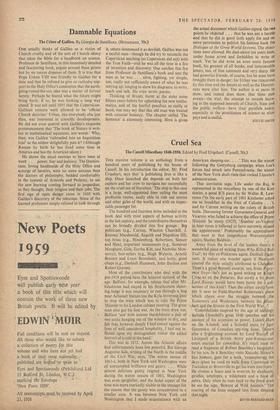Sea Cruel
The Cassell Miscellany 18484958. Edi ted by Fred Urquhart. (Cassell, 30s.)
THIS massive volume is an anthology from a hundred years of publishing by the house of Cassell. In his introduction the editor, Mr. Fred Urquhart, says that 'a publishing firm is like a ship. Once launched she depends on both her captain and her crew to navigate her successfully on the cruel sea of literature.' The ship in this case is a large, well-appointed liner sailing the most profitable routes, easily able to ride out storms and other gales of the world, and with an impec-
cable passenger list. . The hundred and fourteen items included in the book deal with most aspects of human activity in the last century, and the contributors themselves can be broadly divided into five groups : Big politicoes (e.g., Curzon, Winston Churchill, J. Ramsay Macdonald, Asquith and Napoleon top brass (e.g., Hindenburg, Robertson, Slessor and Slim), important monuments (e.g., Somerset Maugham, Gide, Eartha Kitt, and Nicholas Mon- sarrat), best-sellers (e.g., Hugh Walpole, Arnold Bennett and Louis Bromfield), and lastly,' good chaps (e.g., Dashiell Hammett, John Buchan, and Robert Graves). ; Most of the contributors who deal with the pre-1914 period, have the leisured outlook of the age. Balfour, for example, relates that after Mr. Gladstone had stayed in his Strathconon shoot- ing lodge it was necessary to run through a, bog near Achanalt Station (on the Kyle-Inverness,line) to stop the train which was tp take the Prime Minister to his London cabinet meeting. The great man also got his, feet wet. As the train, drew. out, Balfour `saw with intense thankfulness a pair of wet socks hanging. out of the window to dry, and felt that, however deeply I had sinned against the laws of well considered hospitality, I had not in- flicted upon my distinguished visitor the added horrors of a cold in the head.'
This was in 1872. Across the Atlantic affairs had unfortunately been less peaceful. But George Augustus Sala, writing of the North in the middle of the, Civil War, says, 'The winter season of 1863-4, both in New York and Washington were of unexampled brilliance and gaiety.. . . While almost delirious gaiety reigned in New York during the winter season of 1863, Washington was even sprightlier, and the festal aspect of the time was more markedly visible to the stranger for the reason that the gaiety was concentrated in a smaller area. It was between New York and Washington that I made acquaintance with an
American sleeping-car. . .',This was the winter following the Gettysburg campaign when Lee's forces had struck into Pennsylvania, the winter of the New York draft riots that rocked Lincoln's administration.
That inevitable saga, Life under the Raj, is represented in the miscellany by one of the Kim stories, a good ICS piece by Sir Waiter R. Law- rence On the early part of 1903 Kitchener asked me to breakfast in the Fort of Calcutta . and by Curzon writing on the rulers of British India. Discussing former Governors-General and Viceroys who failed to achieve the office of Prime Minister he 'states (1925),.`Another ex-ViceioY in later times is believed. to have narrowly missed the apPdintment.' presumably the appointment that went to that insignificant Worcestershire sqUire, Stanley Baldwin. • , Away from the level of the 'leaders there's a wonderful piece of writing from Who Killed lJob Teal?, by that ex,Pinkerton agent, Dashiell Ham- mett. It makes one wonder again if Hanimett created the style usually attributed to ChanAler. ThereS; good Bennett' excerpt, too, from Riky- grim Steps--he's just as good writing on King's cross:as on the potteries. But surely a bitigom . Lord,.(?aingo would have been better for .4 col-
lection of this:kind? Then the editor. couldjhave put it next to" Field-Marshal Robertson's piece Which 'chews over the struggle betwedithe Easterners and Westerneis, between the ,hiass- -..hatS apd the Frocks in the First World War'. •
'Contributions inspired by the age of ideblogy inchyde, Churchill's great 1940 speeches and his account, of his accession to power, Liddell,Hart on the A,boinb, and a fictional piece 1?); gor Gouzenko, of Canadian spy-ring fame. There's also a • frightening account by Lord 'Russell of Liyerpool of. a British Army post-Koreap-war Court .martial for CoWardice. It's' much nicer to read a fragMent of Robert Benchley's biography by his son. In it Benchley visits Xanadu, Hrearst's San Simeon, goes for a walk, 'remembering the days ;when he used to walk from Crestwood to Tuckahoe or Bronxville to get his train into town.' He crosses a fence and is overrun by elephants, giraffes, antelopes, a wildebeest and a herd of zebra. Only when he. runs back'to the fence does he see the sign,, 'Beware of Wild Animals.' The roaring of the lions stopped him from sleeping that night.
DAVID BERNARD REES


































 Previous page
Previous page